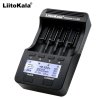SentinelAeon
Member
Like i said, on/off switch doesnt affect amplifier, only when power is coming off affects it. If it is OFF and microusb is plugged in (and battery is not), it will run the amplifier through microusb power. If its ON and battery is inserted, it will use battery power. I saw online tutorials where they just connected 5V directly to microusb.
Anyway i will unsolder the switch. That i hope means that it will be completely off no matter where the power is coming from. Then i just have to figure out which pins to connect to make it work through microusb. I have some simple switches from old power suplies, they should do the work.
Anyway i will unsolder the switch. That i hope means that it will be completely off no matter where the power is coming from. Then i just have to figure out which pins to connect to make it work through microusb. I have some simple switches from old power suplies, they should do the work.



